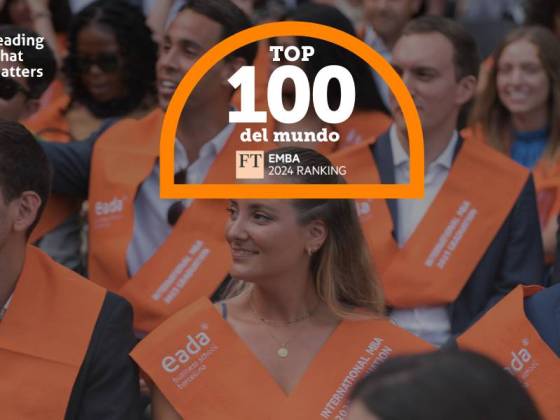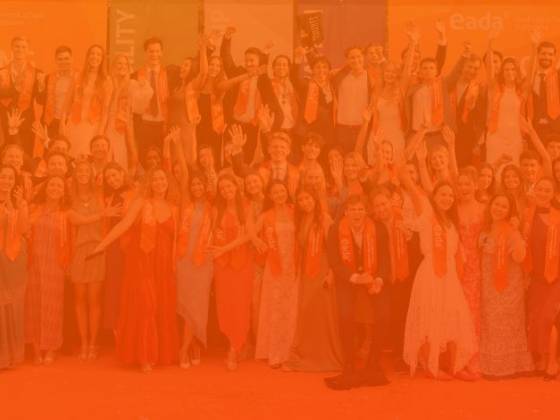EADA Sustainability Week 2022
 In a year dominated by a global pandemic, the sustainability revolution has accelerated faster than expected, while also expanding to include a wider range of environmental and social issues. International participants reflected on these topics during the EADA Sustainability Week 2022, which took place this year from February 28 to March 4. International Master’s students attended electives conducted by visiting faculty and business leaders from all over the world. Electives included:
In a year dominated by a global pandemic, the sustainability revolution has accelerated faster than expected, while also expanding to include a wider range of environmental and social issues. International participants reflected on these topics during the EADA Sustainability Week 2022, which took place this year from February 28 to March 4. International Master’s students attended electives conducted by visiting faculty and business leaders from all over the world. Electives included:
Activist Shareholders and ESG Agendas: the controversial dilemmas for leading consumer companies taught by entrepreneur, professor and corporate leader Iván Cuesta. According to him, “The pressure of activist shareholders directly affects the company’s sustainability agenda and its potential financial consequences; they could cause financial and legal problems and also reputation conflicts.” He added: “Institutional and activist investors request every time more ambitious targets in terms of environmental and social agendas. The pressure is actually on the governance practices because there is evidence that there is a correlation between governance performance and financials.”
Transforming business paradigms from net-zero emissions to nature-positive strategies taught by Eduardo Escobedo, professor in environmental management strategies and sustainable operations and Executive Director of the Responsible Ecosystems Sourcing Platforms (RESP). Mr Escobedo gave to participants a 360º vision of environmental sustainability’s application to business, sharing insights on how companies can achieve a positive impact: “Companies should readopt a long-term vision away from the short-term, result-based outlook that many companies are using. There is also clearly a need to integrate a value-based approach that considers success and achievement not only in economic and commercial terms.” To him, “The current focus largely on reducing greenhouse gas emissions to zero will not be effective, in the long term, to ensure the kind of environmental sustainability needed for our planet and our businesses to continue thriving.”
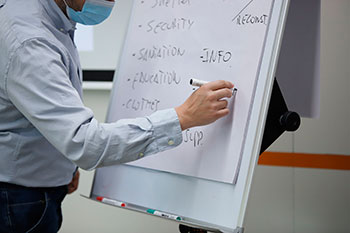 Narrative and numbers: critical keys to the challenging transformation from linear to circular business models taught by Professor Ed Weenk, lecturer, corporate advisor and training facilitator with a wide range of experience in managing international logistics and distribution projects at strategic and operational levels. To Mr Weenk, “Transforming from linear to circular requires changes in pretty much all aspects of a company’s business model, from segments and value propositions to operational set-ups, revenue models and cost structures.” Participants had the chance to gain an in-depth look into the detailed decisions to be taken in different departments of a company to implement different circular strategies.
Narrative and numbers: critical keys to the challenging transformation from linear to circular business models taught by Professor Ed Weenk, lecturer, corporate advisor and training facilitator with a wide range of experience in managing international logistics and distribution projects at strategic and operational levels. To Mr Weenk, “Transforming from linear to circular requires changes in pretty much all aspects of a company’s business model, from segments and value propositions to operational set-ups, revenue models and cost structures.” Participants had the chance to gain an in-depth look into the detailed decisions to be taken in different departments of a company to implement different circular strategies.
Financing climate change: How financial actors can play a pivotal role in the transition towards a low carbon economy and which compromises, products and mechanisms are required for it? Who finances climate change? Taught by Dr Christian Schmaltz, adjunct professor at EADA and financial advisor for companies on risk management, sustainability and regulation. According to Dr Schmaltz, “Although the financial sector is part of the problem of global warming, it can also be part of its solution. In a capitalist system, money is the key to allocating resources and, therefore, deciding which projects will be carried out and which will not. Many projects require financing, i.e., from banks, investment funds and insurance companies.”
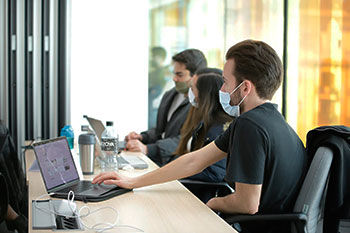 Managing humanitarian emergencies taught by Xavier Bartrolí and Núria Salse. Mr Bartrolí is Co-Founder of the Cooperativa Humanitaria and Núria Salse is in charge of the Department of Nutrition and Health at Action Against Hunger. Together, they guided students through the main components of humanitarian responses in emergencies. According to Mr Bartrolí and Ms Salse, “aid action is provided in the moment of a disaster of crisis affecting populations” and is based on three main pillars: saving lives, alleviating suffering and providing dignity. Mr Bartrolí and Ms Salse shared some tips on responding to humanitarian emergencies: “Firstly, to identify the most vital needs of the population and to plan a response by defining the proper objectives and the resources and activities to achieve them. Secondly, to protect the victims and ensure their rights and dignity.”
Managing humanitarian emergencies taught by Xavier Bartrolí and Núria Salse. Mr Bartrolí is Co-Founder of the Cooperativa Humanitaria and Núria Salse is in charge of the Department of Nutrition and Health at Action Against Hunger. Together, they guided students through the main components of humanitarian responses in emergencies. According to Mr Bartrolí and Ms Salse, “aid action is provided in the moment of a disaster of crisis affecting populations” and is based on three main pillars: saving lives, alleviating suffering and providing dignity. Mr Bartrolí and Ms Salse shared some tips on responding to humanitarian emergencies: “Firstly, to identify the most vital needs of the population and to plan a response by defining the proper objectives and the resources and activities to achieve them. Secondly, to protect the victims and ensure their rights and dignity.”
Corporate sustainability and competitive advantage taught by Dr Paolo Taticchi, Visiting Professor in Strategy and Sustainability at EADA and Deputy Director at the UCL School of Management. In this course, Dr Taticchi shared his belief that “developing a sustainable competitive advantage is a key in today’s agendas of global executives”. To him, “Leaders should promote sustainability not only in all areas of the organisations, but among the other players of the industry. They have the responsibility to educate the industry and support smart initiatives in this field, despite not having profits in the short-term.” Dr Taticchi highlighted that the concept of sustainability is so close to the concept of quality of life because it is linked to the economical, social and environmental dimensions: “In the context of sustainable development, businesses that are often referred to as part of the problem can be part of the solution.”
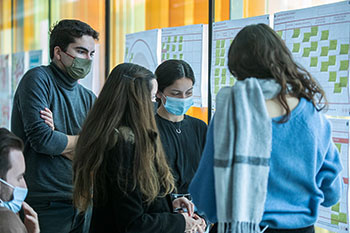 Technology for circular economy and competitiveness designed by Dr Saman Sarbazvatan, Director of Programmes at École Des Ponts Business School and Senior Advisor of Technology and Business Modeling at Circular Economy Reasearch Center. Throughout this course, participants acquired an in-depth vision of the digital economy, sustainable competitiveness, industrial innovation and business models. “The common denominator among technology, circular economy, sustainable competitiveness and innovation in business models would be leadership-oriented towards a purpose related to inclusive innovation with social and environmental impact.”
Technology for circular economy and competitiveness designed by Dr Saman Sarbazvatan, Director of Programmes at École Des Ponts Business School and Senior Advisor of Technology and Business Modeling at Circular Economy Reasearch Center. Throughout this course, participants acquired an in-depth vision of the digital economy, sustainable competitiveness, industrial innovation and business models. “The common denominator among technology, circular economy, sustainable competitiveness and innovation in business models would be leadership-oriented towards a purpose related to inclusive innovation with social and environmental impact.”
Regenerative platform business models: In this course, participants applied platform design principles with a regenerative mindset. It was taught by Lucía Hernández, an expert in Platform Economy and Regenerative Design and Consultant for the UN. She is also President of Ouishare, an international think and do tank that explores how the platform economy is impacting different sectors, markets, organisations and society in general. As Ms Hernández said, “regenerative platforms represent a new generation of business models that take into account people and communities, economic benefits and the planet, all in one.” She highlighted: “platforms are more efficient because they add more value and are more transparent than traditional models, as well as being cheaper and easier to implement.”

